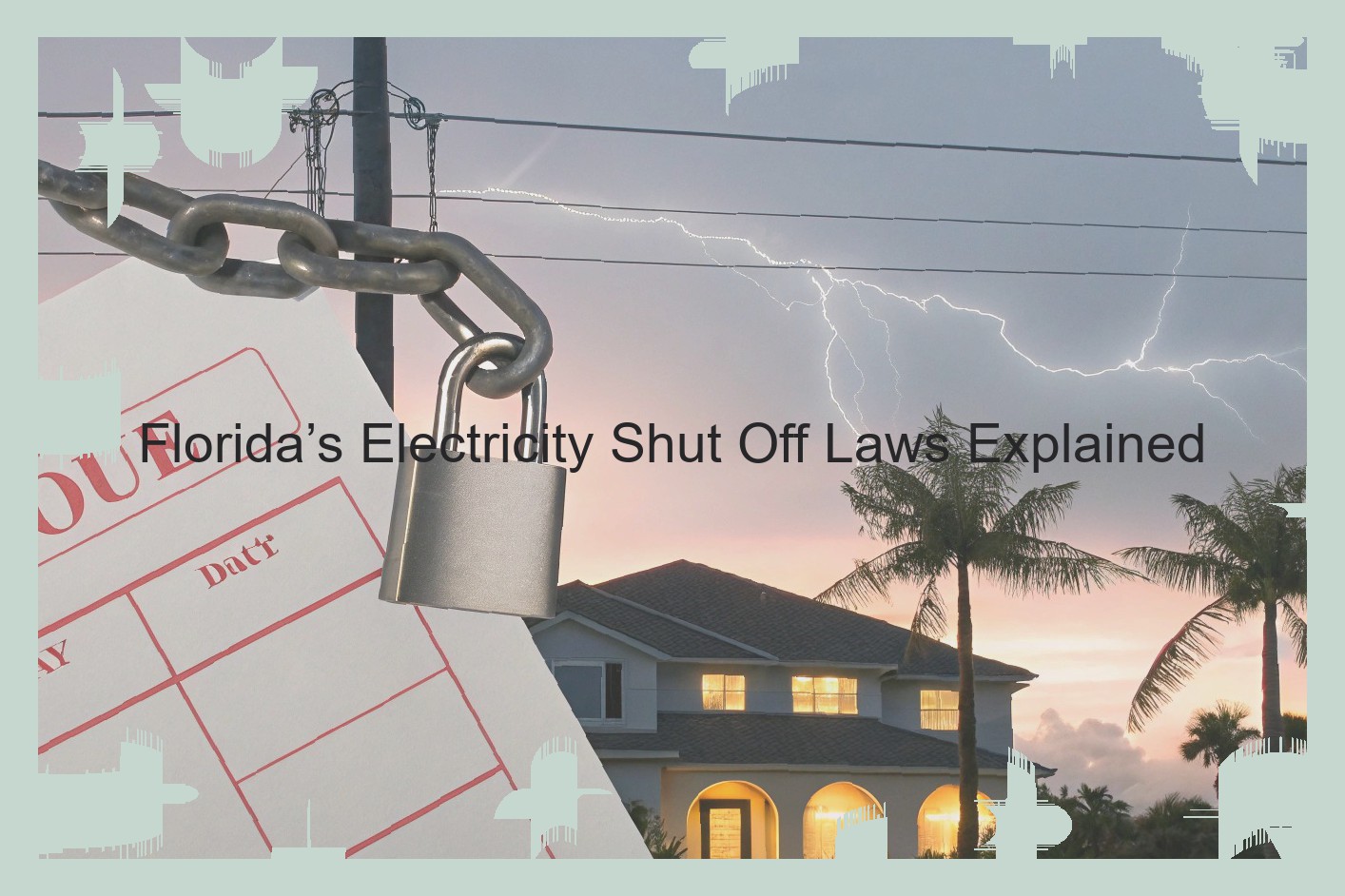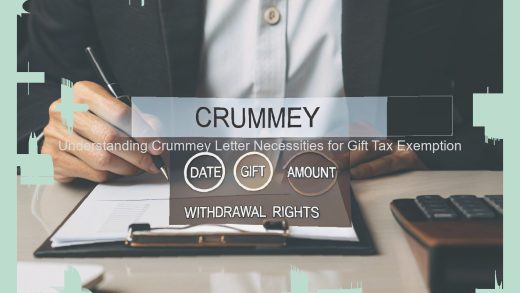All About Electricity Shut Off
Electricity shut-offs in Florida are governed by laws and regulations that dictate how utility companies can handle non-payments and the procedures they must follow before disconnecting service. These regulations provide strong protections for consumers, as they prohibit utility service providers from discontinuing services in a variety of circumstances.
Pursuant to Florida Statutes § 366.95, a utility company must offer at least one other method of payment for a bill and cannot assess a fee for the use of an approved alternate method of payment.
Florida Statutes § 366.81(1)(e) states that it is unlawful for a utility company to disconnect service:
Many of the rules governing electricity shut offs in Florida are found in Florida Administrative Code and the Florida Public Service Commission has jurisdiction over some of these regulations.
The utility company is required to establish a set of reasonable terms and conditions under which service may be refused or discontinued for nonpayment of a bill. These provision must be approved by the Florida Public Service Commission (FPSC). If a bill is not paid by the due date , then the utility company must contact the customer in writing. The notice must include a date on or after which service will be disconnected if the bill is not paid. The customer must have ten days to pay the bill before service can be disconnected.
The ruling in Perdomo v. FL Dept. of Children & Families, 2016 WL 3213496 illustrates how politicized electricity shut-offs have become in Florida. In this case, the Florida Department of Children and Families (DCF) filed an amicus brief to support the arguments that a non-profit organization and three private individuals had made against the company Florida Power & Light (FP&L) in 2016. The nonprofit and individuals argued that FP&L’s shut-off policy violated the constitutional right to substantive due process. The court agreed with DCF and held that Florida Power & Light Company’s policy could violate due process when it comes to the fundamental right of shelter and necessary utilities.
Legal Aid Services and other organizations have argued that shutting off power to low-income customers is simply bad public policy. They argue that such cut-off policies often result in the poor losing both their home and electricity, and they suggest that there should be more emphasis on providing affordable housing and utility payments.

People’s Rights Regarding a Shut Off
Consumer Rights and Proteions :
Florida law provides consumers with certain rights and protections when it comes to electricity service. Specifically, Florida law prohibits electric companies from "disconnect[ing] service to a residential customer for nonpayment of a delinquent account unless the company has first made a reasonable effort to notify the customer," provided that customers do not owe for more than one delinquent account, and it is impractical to make such notice in person, by telephone, or otherwise. When not otherwise impracticable, the notification must be made at least five (5) days prior to the date that service may be shut-off for nonpayment. In addition, the utility company must make good faith efforts to provide such notice to the customer, which includes the following:
- (1) Placing the customer’s delinquency notice on or in a clearly identified envelope placed in the front door or security with a clearly identifiable badge of the utility showing it was placed there by its representative.
- (2) Voice contact via telephone call or recorded message left at the customer’s residence or business.
- (3) Placing a written notice on the inside or outside door of the premises, if otherwise unfound or by reason of presence at the utility office, is impracticable.
- (4) Sending the customer written notice by First-Class Mail, postage prepaid.
- (5) Other methods permitted by the commission.
Note that a utility company is only required to provide this notice once every twelve months, unless circumstances such as safety or special needs dictate otherwise.
Legally Allowable Shut Off Conditions
Electric utilities in Florida have the right to disconnect services for a variety of reasons. They must give the customer notice before they turn off a residence’s lights so that the customer has an opportunity to pay the bill or make other arrangements with the utility. Notably, Florida law requires that: (a) disconnection be after reasonable notice; and (b) the customer be given a reasonable opportunity to make payment arrangements. Casto v. Southern Bell Tel. & Tel. Co., 351 So. 2d 24, 26 (Fla. 2d DCA 1977).
To disconnect electric services, the utility company must provide "at least 5 days’ written notice prior to disconnection, which shall not be less than 7 days after the final bill was issued, which notice shall include the date the bill was issued, the date payment is due, and the time and date service is to be discontinued[.]" Fla. Stat. § 366.95(4)(b)(1). In any situation where the required notice cannot be issued, the utility company must call the customer with the required information no less than 48 hours before disconnection. Id.
Additionally, the Florida public service commission provides guidelines for reconnection of service without assessing additional charges. This includes that (a) service will be reconnected no later than the end of the next business day following the customer’s request, or (b) wherever service was interrupted for three consecutive days or more, service will be reconnected within 24 hours of the customer’s request. Fla. Admin. Code R. 25-6.0341(4)(b).
Other Circumstances
Certain provisions in Florida law delay or exempt electricity shut-off. Some require the customer to provide documentation and some require the customer to follow special procedures.
Medical Issues
Florida law allows electricity companies to delay shut-off for customers who provide proof that electricity is medically necessary to treat a medical condition. A license medical doctor, osteopath, physician’s assistant, or advanced registered nurse practitioner needs to affirm in writing that there is a household member with a medical issue that is sensitive to electricity. Common conditions that warrant an exemption include apnea monitors for babies, life support equipment, diabetes monitors, and kidney dialysis equipment. The law additionally requires the patient to be a medical homebound person. Homebound means a person that has a medical condition that makes them unable to leave their home without some movement impairment or is under a doctor’s order to stay at home because of a medical condition. Once the electricity company has the written notice of medical homebound status, the company must delay shut-off. The length of the delay depends on the length of the previous payment history. In particular, the shut-off is delayed until the earliest of: The law further delays shut-off for a period of five days as long as the customer does not violate any provision, including failing to keep the account current with payment, the residential account is not delinquent, and the medical condition is still restrictive.
Catastrophic Events/Severe Weather
Florida laws also requires electricity companies to suspend shut-off for catastrophic events like natural disasters and extreme weather conditions. If an electricity company declares an emergency, shut-off must be suspended in the disaster area for 15 days from the date of the order. The electricity company has the discretion to postpone temporarily shut-offs in the remaining areas of their service territories as long as there is no violation of the law.
Low-Income Households
Another exception to shut-off is for low-income households. Florida law states that shut-off shall be avoided if the household has an annual income that does not exceed 200% percent of the federal poverty level guidelines and the household is provided with assistance. In essence, if a family’s annual income is low, and they seek assistance from LIHEAP, the electricity company must have a guideline waiver.
What to Do if Facing a Shut Off
In the unfortunate event that you receive a shut-off notice, the first step is to contact your electric company to determine if the bill remains unpaid, or if the consumer has made an adjustment request that is still pending. If the bill remains unpaid, discuss potential payment options with the Company. If the adjustment request is unresolved, consumers can contact the Commission for assistance or advice on the next steps available.
In some situations, however, a consumer may be unable to pay the amount due by the due date, especially in times of financial hardship. This can happen due to unforeseen circumstances such as loss of a job, medical emergency, business closure, disability, personal circumstances, or an unexpected car or home repair. In these tough times, help may be available through the electric company, through government assistance programs, or through other means.
Other than requiring deposit payments (if applicable), electric companies may grant extensions on payments due under certain circumstances . Therefore, as a first step, consumers should ask the electric company for an extension. If the extension is declined or if the consumer cannot make the payment by the extended due date, the consumer may try to apply for government assistance through the state Office of Energy. Additionally, under the federal Low Income Home Energy Assistance Program ("LIHEAP"), Americans may be eligible for assistance with payments. LIHEAP assists eligible (low income) families or individuals with their residential energy bills. The amount of assistance depends on household size and income, and it does not need to be repaid. Assistance is provided in the form of a one-time payment made to the household’s gas or electric vendor to pay all or part of the overdue or current energy bill.
Medically high-risk customers who provide valid documentation of a medical condition that requires continued electric service may also have their cut-off postponed. It’s important to remember that even if a medical necessity is documented, electric service can still be cut off ten (10) days after the postponement expiration date.
Challenging a Shut Off Notice
In Florida, the process to dispute a shut-off notice should be initiated as early as possible. Customers have access to a variety of resources to aid in the dispute process. A shut-off notice can be disputed even before a utility company enters the home. The Florida Public Service Commission has established their own dispute process, referred to as Alternative Dispute Resolution (ADR). Those who attempt ADR, will still receive a shut-off notice. Upon receiving the shut-off notice, the customer must send the utility company written notification of the dispute. Sufficient information should be included in the written notification to resolve the dispute or at a minimum, to delay the shut-off. Enclosed within the written notification should be:
A rejection of the alternate method offered by the utility company.
A request that the service be continued.
A description of the circumstances that led to the dispute and an explanation of why the customer believes the circumstances are correct.
Verification that the payment was credited properly.
A request that a company representative perform a verification of the shut-off for nonpayment.
Ultimately disputes are resolved through many channels. The Florida Public Service Commission provides services upon customer request. Utility companies are private entities regulated by the Florida Public Service Commission and those entities cannot discontinue service provisions to customers under certain conditions that are enumerated in chapters 25-6.060 through 25-6.064 of the Florida Administrative Code. Section 12 of the Florida Public Service Commission’s Rules ensures the continuation of utility services to customers.
Help Programs and Resources
If you are currently facing the prospect of having your electricity shut off, there is help available. Florida residents will have access to a variety of accounts and assistance programs for those that can show proof of need. Most utility companies will have their own set of programs to provide assistance to their customers. You may be able to find one that is designed to meet your specific needs. In addition, these agencies may offer other forms of assistance to help with housing costs and bills.
Below, please find addresses and telephone numbers for organizations that can be contacted for aid regarding electricity shut-offs.
City of Tallahassee
Utilities Financial Assistance Program
P.O. Box 4168
Tallahassee, FL 32315-4168
(850) 891-4968
Florida Power & Light Company (TECO)
Customer Service – Energy Assistance Program
P.O. Box 25627
St. Petersburg, FL 33740-5627
(727) 449-1834
Emergency Customer Service
(800) 282-0777
Okaloosa Gas District
P.O. Box 6586
Ft. Walton Beach, FL 32566-6586
(850) 864-9724
Peoples Gas System
211 East Cass Street
Tampa, FL 33602-5490
(813) 872-8200
(800) 877-5050
Power To Care – Funded by the Salvation Army
P.O. Box 1597
Tampa, FL 33601
(813) 226-1845 x 3042
Progress Energy Florida
One Progress Plaza, 30th Floor
St . Petersburg, FL 33701
(727) 824-2900
(800) 700-8744
Seminole Electric Co-op
P.O. Box 419550
Exmore, VA 23380-9550
(772) 567-2511
Gulf Coast Electric Cooperative
P.O. Box 2029
Wewahitchka, FL 32465
(850) 639-2085 0 (850) 639-2202
Orlando Utilities Commission
P.O. Box 3209
Orlando, FL 32802-3209
(407) 235-0000
HEW Program
Administrative Office Complex
600 W. Peach St.
Ocala, FL 34474
(800) 251-8687 ext. 3934
Florida Electric Co-op
Communication Center
P.O. Box 2910
Havana, Florida, 32335
(850) 539-6000
(800) 227-2852
Sam’s Club
401 Blanding Blvd.
Orange Park, FL
(904) 272-5565
Orlando Union Rescue Mission
PO Box 4537
Orlando, FL 32802
(407) 423-8581
Salvation Army
PO Box 3559
Orlando, FL 32802
(407) 423-8581
Crisis Resource Center
2110 Orlando Blvd.
Orlando, FL 32804
(407) 836-8888
Children’s Home Society of Florida
PO Box 1148
Lake City, FL 32056
(386) 754-2221
Associated Marine Institute
PO Box 4887
Havana, FL 32334
(850) 627-9605
American Red Cross
Keep It Cold program
PO Box 446
Gainesville, FL 32602
(352) 376-4669
National Consumer Law Center
(617) 542-8010
Florida Circuit Court
Broward County
(954) 831-8423
United Way of Miami-Dade
(305) 646-7000



